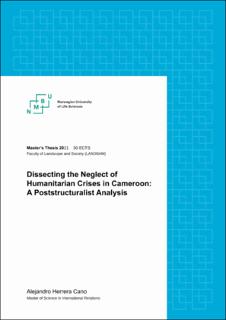| dc.description.abstract | Millions of people around the world remain trapped in ignored humanitarian crises. Faced by worsening conditions, the work of humanitarian agencies, governments, and natural persons cannot fully meet the needs of vulnerable communities. Although the principles of humanity, impartiality, neutrality, and independence underpin humanitarian aid, some crises garner more attention and financial support. Such is the case of the Republic of Cameroon, where three humanitarian emergencies converge: the insurgency of the Jihadi group Boko Haram in the far north, a civil war between francophone separatists and the armed forces in the west, and a refugee crisis from the Central African Republic and the Democratic Republic of the Congo in the east. Despite the severity of these emergencies, Cameroon seldom makes headlines, the authorities’ response is insufficient, and the international community remains silent to the plight of Cameroonians. The following master thesis comes as a reaction to the publication of the report The world’s most neglected displacement crises in 2019, where Cameroon tops the list (NRC, 2019). The research consists of a literature review that draws on poststructural thinking in international relations to unravel the causes of neglect of the Cameroonian crises. The study aims to dissect the complex social and political dynamics that define the inaction of those involved. The discussion section analyses interventions by key actors and events and drawing from ideas by renowned poststructuralist authors such as Michel Foucault, Jacques Derrida, and Judith Butler, amongst others. The study found that hegemonic actors, such as the central government of Yaoundé and the Cameroonian Armed Forces, by means of discursive formations, have recreated constructed realities where their passivity toward the Boko Haram conflict is justified. Media outlets have relied on identitarian issues, such as the composition of the fighting factions in the Anglophone Crisis, rather than broadcasting the needs of displaced populations and have misrepresented the problems faced by refugees in the east. Finally, international actors have been found to influence collective consciousness with discursive strategies to divest funds from humanitarian crises and suit their political agendas. | en_US |

